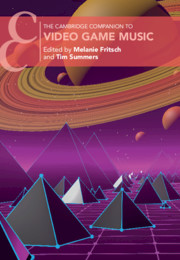Book contents
- The Cambridge Companion to Video Game Music
- Cambridge Companions to Music
- The Cambridge Companion to Video Game Music
- Copyright page
- Contents
- Figures
- Tables
- Musical Examples
- Contributors
- Preface
- A Landmark Timeline of Video Game Music
- Foreword: The Collaborative Art of Game Music
- Introduction
- Part I Chiptunes
- Part II Creating and Programming Game Music
- Part III Analytical Approaches to Video Game Music
- Part IV Realities, Perception and Psychology
- 15 A Step Back from Reality: Sound and Presence in Computer Games and Other Worlds
- 16 Audio and the Experience of Gaming: A Cognitive-Emotional Approach to Video Game Sound
- 17 Psychophysiological Approaches to Sound and Music in Games
- Part V Game Music, Contexts and Identities
- Part VI Beyond the Game
- 24 Producing Game Music Concerts
- Select Bibliography
- Index
15 - A Step Back from Reality: Sound and Presence in Computer Games and Other Worlds
from Part IV - Realities, Perception and Psychology
Published online by Cambridge University Press: 15 April 2021
- The Cambridge Companion to Video Game Music
- Cambridge Companions to Music
- The Cambridge Companion to Video Game Music
- Copyright page
- Contents
- Figures
- Tables
- Musical Examples
- Contributors
- Preface
- A Landmark Timeline of Video Game Music
- Foreword: The Collaborative Art of Game Music
- Introduction
- Part I Chiptunes
- Part II Creating and Programming Game Music
- Part III Analytical Approaches to Video Game Music
- Part IV Realities, Perception and Psychology
- 15 A Step Back from Reality: Sound and Presence in Computer Games and Other Worlds
- 16 Audio and the Experience of Gaming: A Cognitive-Emotional Approach to Video Game Sound
- 17 Psychophysiological Approaches to Sound and Music in Games
- Part V Game Music, Contexts and Identities
- Part VI Beyond the Game
- 24 Producing Game Music Concerts
- Select Bibliography
- Index
Summary
If, as suggested by Donald T. Campbell,1 the result of our particular abilities in sensing and perceiving is that we are distanced from a fundamental reality,2 then what precisely is the nature and role of presence with respect to that reality? Furthermore, given the theme of this companion, what is the role of sound in relation to presence in virtual gameworlds? These are the two questions that underpin this chapter and to which I provide some answers. One question that might be asked, but which I do not attempt to answer, is: what is the role, if any, of music in presence in virtual gameworlds? The answer to this particular question I leave to the reader to attempt once the companion has been read. Other chapters in this companion deal more directly with music and its relationship to narrative and ludic processes or its abilities to provoke emotion in the game player and to establish meaning. These are areas, I suggest, that might be helpfully informed by answering questions about music and presence. Here, I content myself merely with providing some of the groundwork that will help the reader attempt the question. Before moving on to deal with my two questions, I must first clarify some terminology in order to furnish a framework from within which I can then debate them. I begin with a definition of sound.
Information
- Type
- Chapter
- Information
- The Cambridge Companion to Video Game Music , pp. 269 - 283Publisher: Cambridge University PressPrint publication year: 2021
